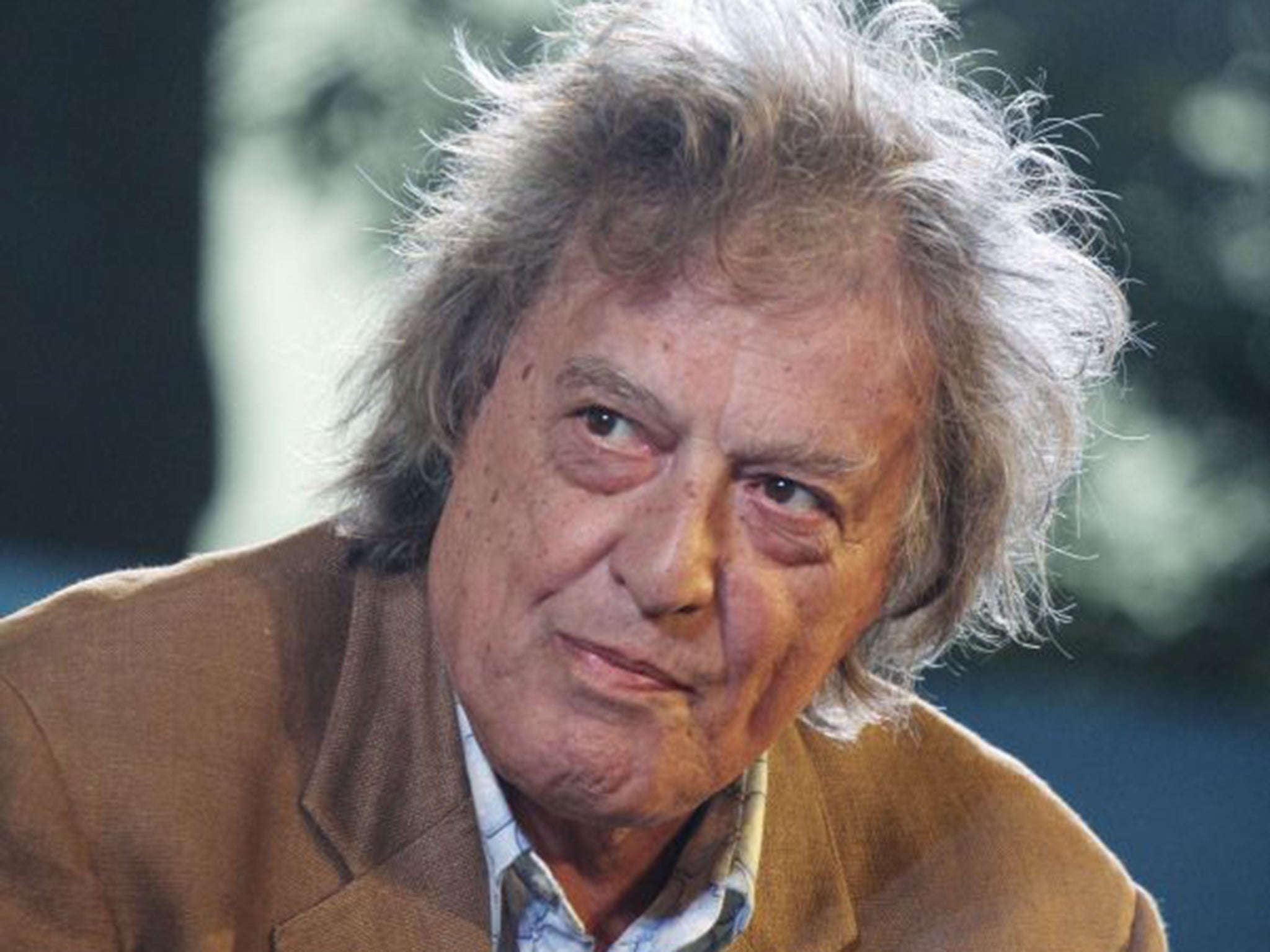Art should not be a slave to the ideas driving it
Critics of Tom Stoppard's new play seem to agree that cerebral can never trump character

Your support helps us to tell the story
From reproductive rights to climate change to Big Tech, The Independent is on the ground when the story is developing. Whether it's investigating the financials of Elon Musk's pro-Trump PAC or producing our latest documentary, 'The A Word', which shines a light on the American women fighting for reproductive rights, we know how important it is to parse out the facts from the messaging.
At such a critical moment in US history, we need reporters on the ground. Your donation allows us to keep sending journalists to speak to both sides of the story.
The Independent is trusted by Americans across the entire political spectrum. And unlike many other quality news outlets, we choose not to lock Americans out of our reporting and analysis with paywalls. We believe quality journalism should be available to everyone, paid for by those who can afford it.
Your support makes all the difference.The curious, or perhaps not so curious, thing about the reviews of Tom Stoppard’s new play The Hard Problem, now showing at the National, was the pronounced similarity of some of the critical language. Words like “cerebral” and “intellectual” abounded, and there was much use of the phrase “play of ideas”, the underlying implication being that certain aspects of this brain-fest might be crowding out the drama.
The Guardian’s Michael Billington, who seemed generally to approve, talked about an “information overload”, Paul Taylor, writing in The Independent, flatly declared that whatever the passion of the exegesis it never quite exerted a strong enough grip.
The Hard Problem features a young psychology researcher at a brain institute who believes in God, has her doubts about evolutionary biology and is mocked for these failings by some of her scientific-materialist colleagues. Even without the cut-and-thrust over the possibility of altruism, onlookers would very soon apprehend that they had fetched up – literally and metaphorically – in what the novelist Ronald Firbank would have called “the heart of a brainy district”. In fact, Sir Tom’s latest shows every sign of turning into a state-of-the-art parable of some of the figurative gin-traps that lie in wait for the creative artist who takes an interest in “ideas”.
Arguments about the play, or the novel, or the painting, or the film “of ideas” come round as regularly as the Great War recruiting sergeant. As a young shaver hanging around literary London a quarter of a century ago I can remember the storming row that followed A N Wilson’s pronouncement that it was a waste of a novelist’s time to “have ideas”. An equally belligerent spat attended his fellow scrivener Nicholas Mosley’s resignation from the panel bidden to judge the 1990 Booker Prize on the grounds that “novels of ideas”, or rather a particular novel of ideas dear to his heart, had been deliberately excluded by his fellow arbiters.
In fact both these engagements, for and against, were to a certain extent red herrings, or rather a mark of the somewhat specialised language that habitually attends these debates. For it hardly needs saying that, whether written by a Nobel laureate, or fashioned by a ghost-writer for a celebrity to sign his name to, every novel found on the Waterstones shelf has an “idea” at its core, just as the life’s work of every writer worth the name can generally be boiled down into some kind of behavioural proposition.

Dickens’s “idea” about life, for example, is that the human beings living it ought to behave better. Iris Murdoch was concerned to distinguish “nice” people from “good” people. Walter Bagehot once complained that Thackeray spent his career trying to demonstrate that “ninth-rate people were actually tenth-rate”, but even if true this presupposes a basic interest in, and judgement of, the way in which Victorian society worked.
Naturally, this fundamental tethering in the life of the mind extends into pictorial art. A painting, for example, may simply try to reproduce the objects the painter had before him on the easel, but arrangement, setting –even, it might be argued, the laying on of the paint – will betray something of what the artist believes about the particular set of social conditions that have produced the artwork. Even if the artist self-consciously eschews any political dimension whatever and paints for “art’s sake”, then the medium in which he or she operates – realism, abstract expressionism or anything else – will at least demonstrate some “ideas” about the nature of art. After all, there is nothing quite so political as a picture postcard if you take the trouble to decode some of the assumptions that run beneath it.
So when critics talk about a work “of ideas” they tend to be referring to a rather specialised redoubt of the novel, drama or painting in which what exists on page, stage or canvas is there, primarily, and for all the attractions of its characters or the vigour of its impasto, to prove, or ventilate, a point. British drama is full of this kind of thing, from the works of Shaw, with their homilies on capitalism and prostitution and class-climbing, to some of the ornaments of the old BBC Play for Today slot. The British novel, too, has a well-worn tradition of cerebral chat, possibly initiated by the Victorian sage George Meredith – of books in which characters achieve their greatest satisfaction from simply chewing the fat over anything from the latest philosophical wisdom to the social and moral issues with which the social groups they represent are currently aflame.
The difficulty inherent in this line of attack is its staginess. The complaint, for example, made of some of the “state of the nation” novels written in the late 1980s as novelists rushed to a man and woman to protest about Mrs Thatcher was that the subject matter of their characters’ dinner party conversations was merely robbed from the newspaper letters pages. They talked about the Aids statistics or the unemployment figures, and in fabricating these conversations the writers were not being true to the reality they aimed to reproduce. The state of the nation, when it came to it, was simply the state of Hampstead Garden Suburb.
There are still “novelists of ideas” around today. Take, for example, the work of Ian McEwan, whose books come crawling with carefully wrought ethical dilemmas and immensely serious discussion of the great topics of the day – see last year’s The Children Act – and yet, at any rate to my mind, seem to betray themselves by way of their sedulousness, the thought that the research into, as it may be, climate change (Solar) or the daily routine of the brain-surgeon (Saturday) came first and the characters were tacked on afterwards. This may be an exaggeration, but it was my then 17-year-old son who, having put one of them down, remarked that he wished McEwan had written the book first, devoid of the exquisite detail filched from the Brain Surgeon’s Gazette, and then checked up on the facts.
If there is any consolation for Sir Tom reading the notices of The Hard Problem (of which even Paul Taylor observed that there is “much to ponder”), it is that “ideas” are particularly attractive to the veteran talent. One could even argue that Shakespeare turned more philosophical as he grew older. On the other hand, drama stands or falls on character, or if not character then human interest.
By chance, on the day I read the Stoppard reviews I went to see Birdman, Alejandro Gonzalez Inarritu’s extraordinary film about an ex-Hollywood actor who determines to direct and star in a Raymond Carver adaptation on Broadway. This, it should straightaway be said, is a “film of ideas” – it could scarcely be anything else – ideas about the movie industry, about the implications of technology and the duties of parenthood. At the same time, Birdman is also a film about individual beings and their destinies, and it is the memory of the people and the personal myths which sustain them that persists once the credits have closed.
Join our commenting forum
Join thought-provoking conversations, follow other Independent readers and see their replies
Comments